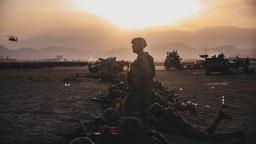Western news organizations are starting to head out of Afghanistan. Spokespeople for The Wall Street Journal, The Washington Post, CBS News, and NBC News all told me on Thursday evening that their reporters have exited the country as the security situation intensifies with the Taliban takeover of Kabul.
The Journal said it no longer has “reporters on the ground in Afghanistan” but remains “committed” to its coverage. The Post said it is relying on “stringers on the ground” and has journalists assisting in nearby countries with “wide past experience in Afghanistan.” CBS said its correspondent, Roxana Saberi, had flown out to Doha where she continues to cover the situation. And NBC said Richard Engel and the rest of the network’s team are now out of the country.
News outlets are making real-time decisions, weighing a variety of factors as they decide whether to keep their personnel in the country or pull them out. Some outlets, such as The Los Angeles Times, are still there. Others are keeping their movements very close to the vest for security reasons. The New York Times, for instance, told me that the paper continues to “cover Afghanistan with reporters and photographers in country and abroad,” but would not clarify on whether that means it still has correspondents on the ground or is relying on freelancers.
The journalists in Afghanistan have been providing valuable reporting that has repeatedly poked holes in how the Biden Administration has portrayed the situation on the ground in Kabul. They’ve pointed out everything from the bureaucratic mess Afghans have had to navigate to apply for a visa to the logistical difficulties of simply getting to the airport. But what happens as these reporters leave? It’s hard to say that the bright light the press has been shining on the mess won’t, like a flashlight slowly being drained of its battery, become dimmer and dimmer.
The Biden team’s ‘cold political calculation’
The New York Times’ Peter Baker
tweeted Thursday that the Biden team’s “cold political calculation is that Americans won’t care what happens in Afghanistan as long as Americans are safe.” Baker pointed out that on Thursday there were “no front-page stories on Afghanistan in cities like Boston, Austin, Chicago, Atlanta, Indianapolis, Fresno or Miami.” And to Baker’s point,
TV ratings also tell a similar story. Channels like CNN and MSNBC simply aren’t seeing a tremendous boost in viewers.
As Brian Stelter
wrote, “White House aides and Biden allies say this week’s news coverage is overheated and out of step with the American public’s views of the matter. Biden critics say the coverage is appropriately channeling moral outrage.”
‘I appear calm, but that doesn’t mean I am calm’
Make sure you don’t miss Kate Storey’s piece in
Esquire that takes you “inside Clarissa Ward’s 19-hour days reporting from Kabul.” Ward told Storey that during tense moments with the Taliban, “I appear calm, but that doesn’t mean I am calm. I don’t panic because you can’t panic in those situations. If you are someone who panics, then you probably should be doing a different job, because it will get you into more trouble. But it doesn’t mean I’m calm on the inside. That’s just the way I deal with fear: I get quiet and very focused.”
LA Times photographer attacked
The
Los Angeles Times said that photographer Marcus Yam was trying to photograph a Taliban flag-raising at a traffic circle in central Kabul “when a Taliban fighter emerged out of nowhere and punched him on the side of the head. The fighter continued to beat Yam and another photographer working for a major U.S. newspaper and then to demand they erase the images they had shot. Yam said at one point he was on his knees urging the armed fighter not to hurt him.” Eventually an “English-speaking militant” intervened, “aware that attacking Western media was not in keeping with the image that the Taliban leadership is trying to project. He offered the photographers an energy drink and released them.”
Afghan journalists also face assault
“Beaten, homes raided, turned away from work for being a woman: the complaints made by some Afghan journalists in recent days are sowing doubt about assurances made by their new Taliban rulers that independent media would be allowed,”
Reuters reported Thursday. In one instance, Radio Television Afghanistan reporter Sahar Nasari said the Taliban confiscated his camera and physically attacked his colleague who was trying to gather footage for a story on Thursday.
>> From the Reuters piece: “A Taliban spokesperson did not respond to a request for comment on accusations that it has harassed journalists, and in particular women in the profession.”
For the record
— “A free press was trying to take root in Afghanistan. Now journalists are bracing for Taliban rule,” Elahe Izadi and Sarah Ellison report… (
WaPo)
— Rebecca Davis writes that Afghan female directors “fear the end of filmmaking” under the Taliban… (
Variety)
— A must-read story from Michael Grynbaum, Tiffany Hsu, and Katie Robertson on how news orgs “got Afghan colleagues out of Kabul.” The Trio write that it was “an exfiltration that came after a global rescue effort stretching from American newsrooms to the halls of the Pentagon to the emir’s palace in Doha, Qatar…” (
NYT)
— Photographer Kiana Hayeri says she has an “enormous amount of guilt” for having left Afghanistan behind: “I have a passport that means I can get out and these people cannot. That is the guilt…” (
NatGeo)
— Azmat Khan argues, “Western journalism and American journalism especially has had a problem in which people too often are very exploitative of locals they hire…” (
The Intercept)
— Thursday marks “seven years since James W. Foley was killed by ISIS in Syria.” The James Foley Foundation tweets that it remains “dedicated to advocating for #journalistsafety worldwide…” (
Twitter)
— As Justin Baragona observes, Sean Hannity is “now outright calling for Biden to resign or be removed…” (
Twitter)
— Meanwhile: A new AP/NORC poll showed that 62 percent of American adults believe the war in Afghanistan was not worth fighting… (
AP)
— Chris Cillizza notes that Biden “isn’t talking” much to the media… (
CNN)
— Two photographs of Biden “neatly illustrated the White House’s fight to contain the fallout of the biggest crisis of his presidency,” CNN’s WH team writes… (
CNN)









